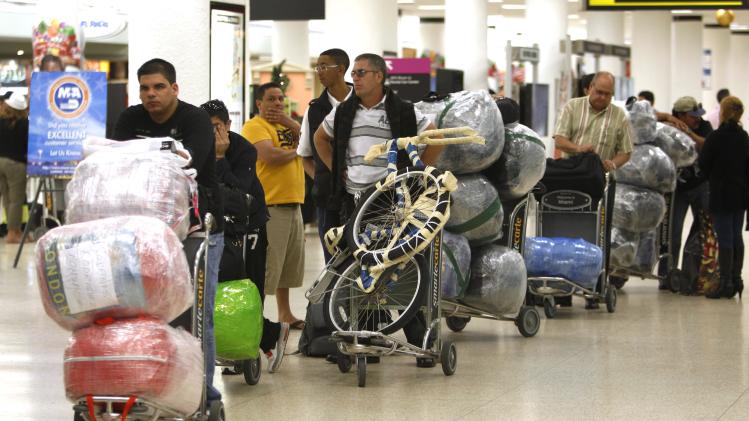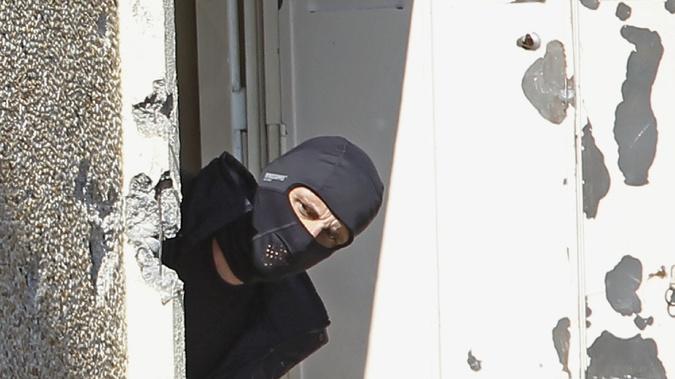Cuba cracks down on goods in flyers' luggage
HAVANA (AP) — A carload of burly nephews and grandsons greeted Martha and Alfredo Gonzalez when they stepped out of Havana's international airport into the blazing heat of an August afternoon.
A round of embraces and the young men got down to business, hefting the retired couple's seven massive duffel bags into a crude two-wheel trailer hooked behind an antiquated sedan for the sole purpose of hauling the half-ton of clothes, medicines and other items the Gonzalezes bought in Miami. A few cars down, Claribel Torrez watched a trailer being loaded with baggage that included a 40-inch television and a bicycle.
"The reason I work 40 hours a week is to bring all this to my family," the 50-year-old Miami fast-food restaurant worker said as her companions tied a tarp over the groaning trailer.
Hundreds of thousands of Cubans and Cuban-Americans fly to and from the island each year thanks to the liberalization of U.S. and Cuban travel rules over the last five years. Their Cuba-bound checked baggage has become a continuous airlift that hauls nearly $2 billion a year worth of car tires, flat-screen televisions, blue jeans, underwear and shampoo to an island where consumer goods are frequently shoddy, scarce and expensive.
That could change on Monday, however, when the Cuban government enacts new rules meant to take a big bite of that traffic, sharply limiting the amount of goods people can bring into Cuba in their luggage, and ship by boat from abroad. The Cuban government says the restrictions are meant to curb abuses that have turned air travel in particular into a way for professional "mules" to illegally import supplies for both black-market businesses and legal private enterprises that are supposed to buy supplies from the state.
Among ordinary Cubans, reactions range from worry to outrage that their primary, and for many only, source of high-quality consumer goods may be throttled.
"People are really unhappy," said Maite Delgado, a 75-year-old retired state worker. "All the clothes and shoes that I have come from my granddaughters in Spain or my siblings in the U.S."
The rules that go into effect Monday run 41 pages and give a sense of the quantity and diversity of the commercial goods arriving in checked bags at Cuba's airports, whose baggage carousels often look like they're disgorging the contents of an entire Wal-Mart or Target store. Travelers will now be allowed to bring in 22 pounds (10 kilos) of detergent instead of 44; one set of hand tools instead of two; and 24 bras instead of 48. Four car tires are still permitted, as are two pieces of baby furniture and two flat-screen televisions. Cuban customs also bars passengers from bringing in items worth more than $1,000. Rather than examining receipts, customs agents are given a long list assigning pre-set values to certain goods ($250 for a video-game console, for example.) Those prices rise sharply under the new rules, making it far easier to reach that $1,000 limit.
The new rules similarly increase the duties paid on goods shipped from abroad, another major source of foreign merchandise for the island.
Authorities have taken to the airwaves and pages of state media in recent days to assure Cubans that the vast majority of travelers won't be affected. The change is intended "to keep certain people from using current rules on non-commercial imports to bring into the country high volumes of goods that are destined for commercial sale and profit," Idalmis Rosales Milanes, deputy chief of Cuban customs, told government newspaper Granma in Friday editions.
The government has justified the new rules with examples of prolific mules including one passenger it said brought in 41 computer monitors and 66 flat-screen TVs in a single year. Another supposedly brought in 34 printers, 58 monitors and 74 computers between 2011 and 2014.
Between $1.7 billion and $1.9 billion worth of goods were flown to Cuba in traveler's baggage last year, with the average flyer bringing in goods worth $3,551, according to a 2013 survey of 1,154 Cuban and Cuban-American travelers conducted by the Havana Consulting Group, a Florida-based private consultancy that studies the Cuban economy.
"It's sustenance, support that greatly aids in the survival of the Cuban family," Consulting Group President Emilio Morales said. "Along with cash remittances, it's the most significant source of earnings for the Cuban population, not the salaries the government pays."
While his study did not look at the final destination of travelers' goods, Morales said he estimated based on his knowledge of the phenomenon that about 60 percent went to families and 40 percent to black-market retailers.
"A sort of long-distance wholesale market has established itself to supplement the lack of a wholesale market in Cuba," he said. "Many people are trying to meet the needs of their family, and other needs that are outside those of the family, like bringing things to sell them."
With foreign reserves dropping sharply over the last two years as Cuba tries to pay off sovereign debt and make itself a more attractive destination for foreign investment, Morales said, the government is desperate to reduce the flow of goods and push Cubans' relatives abroad to send help in the form of cash remittances, which are subjected to hefty government fees. Limiting informal imports also would presumably help boost business in state-controlled stores.
The rule change already has had an effect in Miami, where many stores are dedicated to selling goods to island-bound Cubans and Cuban-Americans.
""Normally I can't even sit down for lunch," said Diana Calzadilla, 28, a cashier at Cadalzo Fashion, a store in Miami's Little Havana neighborhood that sells discount clothing and accessories to travelers on their way to Cuba.
"Look around," she said, nodding at the empty aisles of leggings, baseball caps and tank tops. "I haven't sold almost anything this morning. ... People look around but they don't buy anything because they're not sure how much they're going to be able to bring."
Several "mules" have commented that they are going to look into other ways to make money, she said. At least one customer, she said, appeared decided.
"It was their last trip," she said. "They don't know if they'll go again."
________
Anne-Marie Garcia in Havana, Christine Armario in Miami and Gonzalo Solano in Quito, Ecuador contributed to this report.-
________
Michael Weissenstein on Twitter: https://twitter.com/mweissenstein
Related Video:







